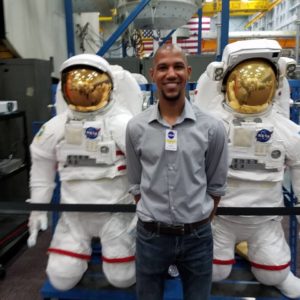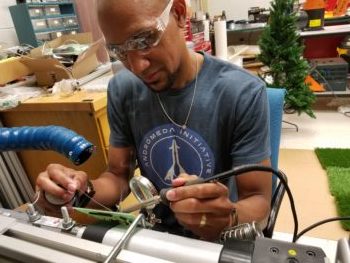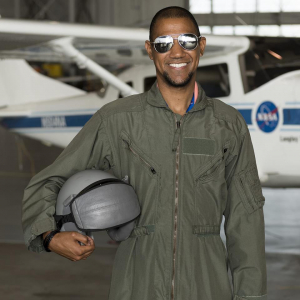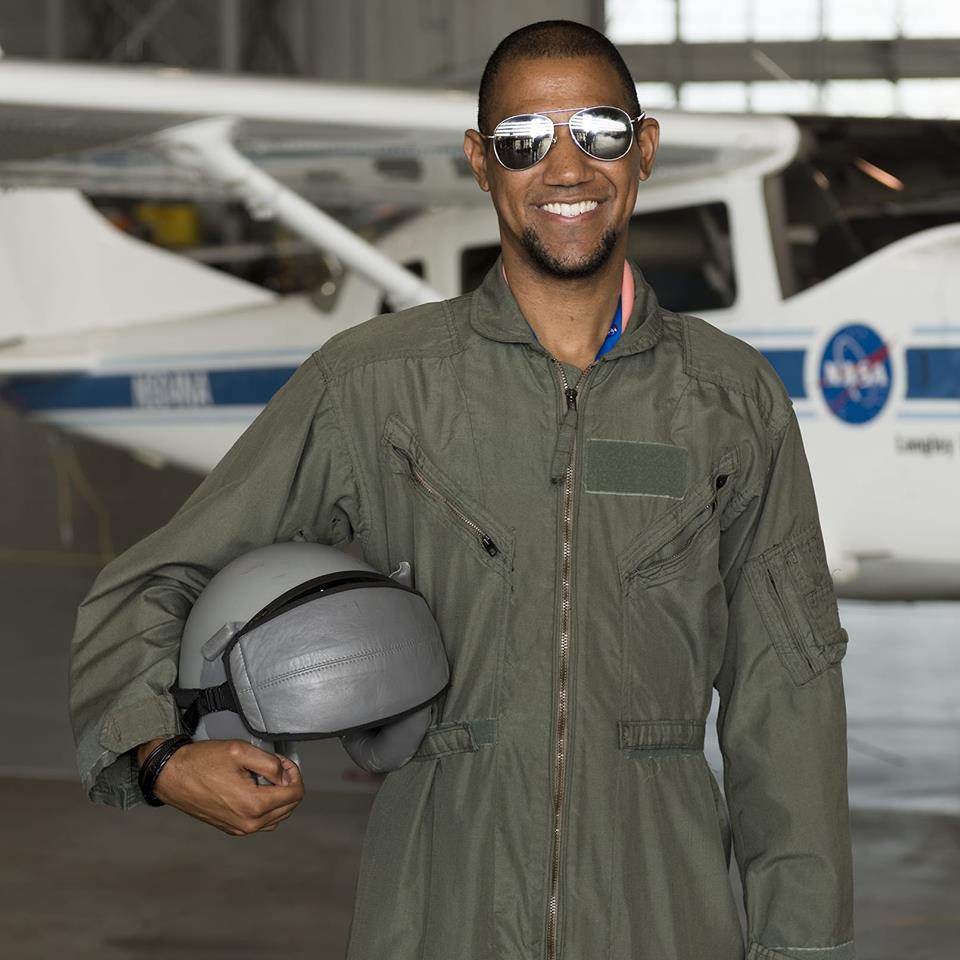Aaron Shepard inspires others and models boldness; he is determined to break the status quo. Too often, we are encouraged to take the safe path and spend a lifetime wondering, “What if?” Aaron took that road, at first, but soon he realized there is never a better time to follow your dreams than now.
Tell me about your current role as a student and NASA intern.
I study electrical engineering at Clemson University. Right  now, I’m working on my master’s degree in robotics and intelligent systems, designing flexible robots that can grab satellites in outer space. In summer 2018 I interned at NASA Langley in Hampton, Virginia. As part of a joint project with Uber, our team built virtual reality simulators for a flying taxi service that Uber plans to offer in the 2030s. I worked primarily as a project manager, but I also helped wire and program the simulator. In addition, our team got to see a lot of the facilities and equipment that helped humans reach the moon during the space race.
now, I’m working on my master’s degree in robotics and intelligent systems, designing flexible robots that can grab satellites in outer space. In summer 2018 I interned at NASA Langley in Hampton, Virginia. As part of a joint project with Uber, our team built virtual reality simulators for a flying taxi service that Uber plans to offer in the 2030s. I worked primarily as a project manager, but I also helped wire and program the simulator. In addition, our team got to see a lot of the facilities and equipment that helped humans reach the moon during the space race.
How old were you when you realized you were interested in space?
I’ve been into space for as long as I can remember. When I was little, my grandma and I would watch hours of “Star Trek” together. The first time I watched a shuttle launch was during fourth-grade science class. The moment I saw the rocket boosters roar to life I knew that I wanted to be an astronaut or, at the very least, work in the space industry.
It was during my freshman year of high school that NASA announced they were canceling the shuttle program. Like many people, I thought this meant the end of space exploration. I tried to “grow up” and find a “realistic” career. I went to college, graduated with a chemistry degree, worked in pharmaceuticals. I even got into medical school. No matter what I did, space was always on my mind. At 25 years old I decided to leave medicine for engineering and take one last shot at fulfilling my childhood dream.
How did you learn about the NASA internship?
In my first year at Clemson, I applied for a research fellowship from NASA’s National Space Grant College and Fellowship Program; Space Grant provides funding assistance and scholarships for students pursuing STEM careers.  I got the fellowship and spent that summer working in a lab at school on my satellite capture robot. The next year, I applied for multiple internships at NASA and was contacted (and selected!) by the coordinator for the Aeronautics Academy at Langley.
I got the fellowship and spent that summer working in a lab at school on my satellite capture robot. The next year, I applied for multiple internships at NASA and was contacted (and selected!) by the coordinator for the Aeronautics Academy at Langley.
What has been your most meaningful accomplishment to date?
Just to get my foot in the door at NASA is a big accomplishment for me. I knew that I was taking a huge risk when I changed careers. Making that decision wasn’t easy at all. There were plenty of times I didn’t feel 100 percent confident about my choice, but I still got up every day and did what I needed to do at school and work. I never gave up on my dreams, and now they are starting to become my reality.
What is the best piece of advice you have ever received?
Begin every day with a task completed. Whether it’s making my bed or finishing responses for a written interview, my days feel more productive when I start by accomplishing something small.
What advice do you have for students enrolled in career and technical education classes?
Don’t procrastinate! Success in education comes down to deadlines and learning time management. If you have a week to do an assignment, do small sections of it each day instead of everything the night before. Working this way is more efficient, and it helps you retain what you’ve learned.
Who has had the biggest influence on your life?
My dad wanted to be an aerospace engineer but he never pursued his dream because he didn’t think he was smart enough. He regretted not following his passion, and his story is what inspired me to follow mine.
What advice do you have for educators trying to inspire students to pursue STEM-related careers?
The media tends to typecast “STEM people”  as smart and socially awkward white males, like Sheldon from “The Big Bang Theory.” It’s hard for individuals who don’t identify with those traits to see themselves in STEM careers. If teachers want to inspire more students to pursue science and engineering, I think it’s crucial that they share more stories in the classroom about the diverse people that make up the STEM fields.
as smart and socially awkward white males, like Sheldon from “The Big Bang Theory.” It’s hard for individuals who don’t identify with those traits to see themselves in STEM careers. If teachers want to inspire more students to pursue science and engineering, I think it’s crucial that they share more stories in the classroom about the diverse people that make up the STEM fields.
Thank you for inspiring us, Aaron! To learn more about Aaron and his space journey, follow him on social media @spacecadetshep, email him or check out his TEDx Talk.
Seize the opportunity to take your own career out of this world!
ACTE and NASA HUNCH have teamed up to present the CTE Month 2019 and NASA HUNCH video challenge. This year’s theme, “Working Out of This World,” encourages students to produce short videos featuring careers, products or services that could be used in future space missions. The deadline to submit is Feb. 1.







